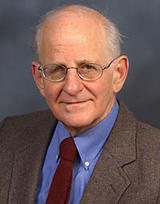Robert Morgan
Professor of Music and the Theory of Music
 Bob Morgan, B.A. Ph.D. Princeton University, faculty member at Yale since 1989: your distinguished career has embodied the best in musical scholarship, combining the musical gifts of a composer with the intellect of a scholar. Beginning your professional musical life as a composer, you gravitated toward music theory and analysis, the discipline in which you have made your most seminal contributions. Many of your published essays—on Ives and Mahler, on Beethoven, on Schenkerian theory, and on many aspects of musical modernism—have long been, and will continue to be, required reading for anyone entering our discipline. Your book Twentieth-Century Music: A History of Musical Style in Modern Europe and America, is the standard text on the subject, and it serves as persuasive evidence that you are one of the very few scholars of your generation who is equally adept in music history and music theory. Further evidence comes from your many doctoral advisees, who have produced influential work on an extraordinarily wide range of topics, and who occupy positions in music in our best universities and schools of music: Princeton, Duke, Notre Dame, Indiana University, the University of Michigan, and many more.
Bob Morgan, B.A. Ph.D. Princeton University, faculty member at Yale since 1989: your distinguished career has embodied the best in musical scholarship, combining the musical gifts of a composer with the intellect of a scholar. Beginning your professional musical life as a composer, you gravitated toward music theory and analysis, the discipline in which you have made your most seminal contributions. Many of your published essays—on Ives and Mahler, on Beethoven, on Schenkerian theory, and on many aspects of musical modernism—have long been, and will continue to be, required reading for anyone entering our discipline. Your book Twentieth-Century Music: A History of Musical Style in Modern Europe and America, is the standard text on the subject, and it serves as persuasive evidence that you are one of the very few scholars of your generation who is equally adept in music history and music theory. Further evidence comes from your many doctoral advisees, who have produced influential work on an extraordinarily wide range of topics, and who occupy positions in music in our best universities and schools of music: Princeton, Duke, Notre Dame, Indiana University, the University of Michigan, and many more.
Since joining the Yale faculty, after teaching at he University of Houston, Temple University, and the University of Chicago, you have ably served the Department of Music, including as DGS and Chair. Your compelling scholarship and teaching have played an integral role in maintaining the vitality of the undergraduate and graduate programs of the Department. Many undergraduates have benefited from the high musical and academic standards of your courses—from our core music theory classes to your courses in musical collage and aspects of musical modernism. And your analytical insights and historical acumen have molded the work of scores of graduate students who have been in our programs, and who have championed you as a powerful reason to come to Yale for graduate work in music. We know that you are in the latter stages of completing a new book, and we know that retirement, whatever else it might bring, will not bring a reduction in your productivity and your engagement with music and musical scholarship. You have brought much to the Department of Music and to Yale, and we are all the richer for it. With hearty congratulations for your splendid career, your Yale faculty colleagues say con brio “Encore, Encore, Encore!”
Tribute Editor: Penelope Laurans